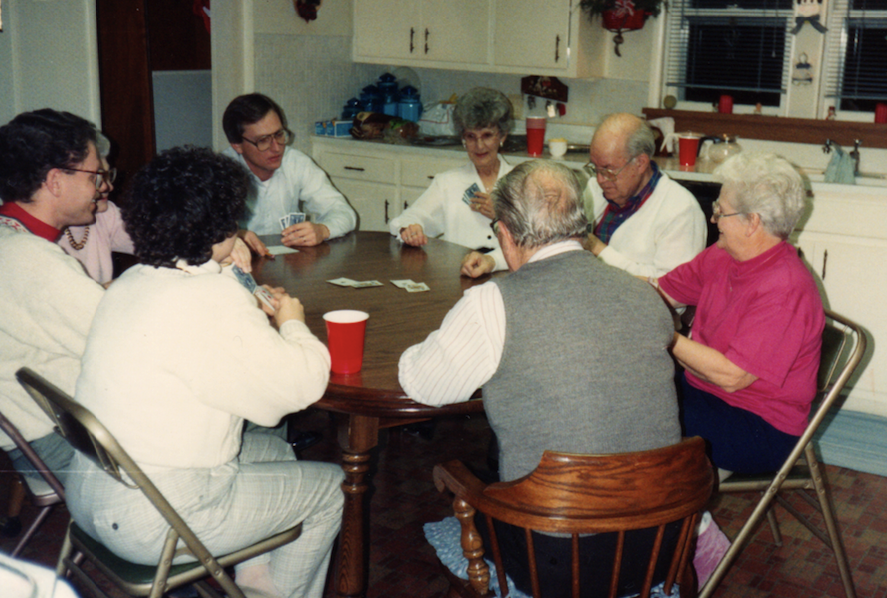Those Not Around the Table
Posted on December 7, 2017

The scarlet and gold promise of mid-harvest has slipped into the gray, damp reality of early winter. Last month we smiled at sun-kissed crops; this month we smile when we see the sun.
On the southern Illinois dairy farm of my youth, November was a month more endured than enjoyed. Its most memorable features were muddy cows, muddy machinery, and often-muttered prayers for weather cold enough to freeze the ground so we could complete harvest by Thanksgiving.
Neither ever happened. Harvest usually dragged on until the next holiday, Christmas. The only consolation to that cold fact was that we weren’t the only ones picking corn in the mud and snow. Back then, very few farmers completed harvest—let alone fall tillage—by Thanksgiving.
Still, outside of milking cows, we never worked on November’s high holiday. Thanksgiving was reserved for family, feasting, and loud, laughter-filled pinochle games with my father’s side of the family.
Those long, wonderful holiday afternoons, like the equally long, wonderful holiday meals, were pure delights. Card partners had been decided at birth; they were, as Grandpa liked to announce, “Missouri Synod,” or women versus men. The friendly competition, however, was anything but ladylike or gentlemanly.
I can still see and hear the usual players—my parents, Dads’ parents, and my grandmother’s two sisters and their husbands—playing eight-handed, single-deck, single-bid pinochle from almost the moment the dinner table was cleared until the minute the supper table was set.
At the head of the table was Grandpa doing the two things he did every card game—keeping score and scowling. The grimaces were usually directed at his own teammates, Uncle Ches and Uncle Pete. Ches was the family comedian who often brought games to a guffaw-filled halt with a clever wisecrack. Uncle Pete was Ches’s perfect straight man. “What’s so funny?” he’d often ask with a face so placid it would ignite another round of full-bellied laughter.
Grandma sat opposite Grandpa at the kitchen-end of the dining room table in the unlikely event someone could possibly want more food during the game. She and her sisters, Aunt Del and Aunt Lu, were as quiet as their husbands were loud. All, however, laughed and laughed when the Ches-and-Pete “What’s trump? Who’s my partner?” comedy routine started.
My grandmother, however, would be the first to get back to the business at hand because she played cards like Ulysses S. Grant commanded a battlefield: she always attacked. Grandma never hesitated to bid over, trump over, and shout over anyone, including her sisters, husband, son or pastor, if they stood between her and card table triumph. Also like Grant, she was humble in victory and quiet in defeat.
Now, 50 years later, all, except my mother, are gone. The first to go of the generation was my grandfather after a summer-long ailment in 1969. The last was Aunt Del, in 2008, after 102 healthy, card-filled years.
After my grandfather’s death, the Thanksgiving meals and card games rotated between Dad’s aunts and two sisters. Since all except Aunt Lu and Uncle Pete lived 40 or more miles from the farm, one of my older brothers or I would “volunteer” to stay home on Thanksgiving to do the evening milking so everyone else could enjoy the holiday.
It was better than it sounds. A three-hour shift in the evening dairy barn with the quiet, easy-going herdsman, Howard, was a small price any teenager would pay for an entire day of no church, no parents, and no hard work.
But I did miss being at a table so sturdy and so generous it could easily hold Grandma’s wonderful food, the family’s roaring, red-hot card games, and a three-generation chorus of almost endless laughter.
I still do, and all will be mentioned—as will many others—when we again give thanks for all their giving.
© ag comm 2017
Share This